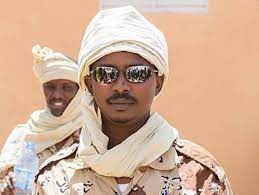The president of the Transitional Military Council (CMT) has justified the seizure of power saying the move was imperative to tackle “the peril that still threatens Chad.”
In his first official speech, delivered on 27 April, Mahamat Deby, the son of the late President Idriss Déby Itno explained that “the senior officials (of the) Defence and Security Forces (FDS) had no choice but to take the path that was necessary in this exceptional circumstance of widespread chaos and the implosion of the country.”
After the announcement of Idriss Deby’s death last Tuesday, the army seized power before suspending the constitution and dissolving the National Assembly.
According to the new strongman in N’Djamena, “the CMT obeys the cardinal concern of facing the absolute urgency of defending our homeland against the aggression it was undergoing, preserving the gains of peace and stability and guaranteeing unity and national cohesion.”
Mahamat Idriss Déby also stressed that the FDS had taken “their responsibilities before history and the people” since “the threat of attacks by other armed groups from abroad remains.”
But until now, a section of the Chadian population does not view it that way.
Protests have been taking place in the capital N’Djamena and other localities on Tuesday with two reported deaths from the ensuing crackdown.
Consequently, the president of the military council was reassuring with regard to fears of a seizure of power.
“The CMT has no other objective than to ensure the continuity of the state, the survival of the nation and prevent it from sinking into nothingness, violence and anarchy. Its members are soldiers who have no other ambition than to serve their country loyally and with honour. Any other attitude will be an unforgivable attack on the memory of the Marshal (Idriss Déby) and the commitment to the people”.
Filling the void
With the council he chairs, Mahamat Idriss Déby is to guide Chad towards “democratic, free and transparent” general elections within eighteen months.
In his address to the nation, the General declared that “democracy and freedom introduced in Chad in 1990 are and will remain irreversible values.”
In addition to the Transitional Military Council, a so-called transition charter published on 21 April provides for the establishment of two other bodies namely, the National Transitional Council and the Transitional Government.
The Prime Minister of the transition is already known.
It is Albert Pahimi Padacké (54), who came second in the presidential election of 11 April.
His mission, according to the president of the CMT, is to form a new government of national reconciliation, composed of a close-knit, competent team, representative of the pluralism in Chad and which will work for “peace, unity and solidarity.”
In the coming days, the new occupant of the Pink Palace promised, a National Transitional Council (legislative body) representing all the provinces and all the living forces of the nation will be put in place.
In any case, the new rulers made it known that the Chadian people are looking forward to “a peaceful, serene and participatory transition.”
To this end, “an inclusive national dialogue” should be held during this period.
In addition, the former Director General of Security Services of State Institutions (DGSSIE) indicated that the CMT will ensure, “every day, without respite, the preservation of stability, national cohesion and our sovereignty.”
He then asked for the support of the international community.
“Chad needs (you) to make this transition a success because the challenges are so immense. (It) needs massive support from its partners to stabilise an economic and financial situation that has been severely impacted by the security, health, humanitarian and social circumstances.
A son’s tribute
Idriss Déby Itno, who ruled Chad with an iron fist for 30 years, is gone forever.
However, his successor is convinced, Deby has “left a legacy on which we can capitalise to cement the unity of the country and accelerate its economic progress.”
On this basis, he called on Chadians to be united: “We must be peaceful citizens and find solutions to our differences together to overcome our common challenges. In its history, our country has experienced so many vicissitudes and trials. In the most critical moments of its existence, Chad has always been able to find the strength and the will not to give up.
According to Mahamat Idriss Déby, the death of the Chadian Marshal, who was trying to repel a column of rebels from neighbouring Libya, is “reserved for great destinies” because he gave “his last breath and his life to preserve Chad from the threat of terrorist groups, supporters of war and plotters of all hues.”
The CMT president also paid tribute to the memory of “Idriss Déby’s brothers in arms who fought alongside him. Some died on the field of honour, others will keep indelible scars.”
If the brutal death of Hissène Habré’s successor has moved Africa so much, it is because he had stood as a bulwark against jihadism in the Lake Chad basin and the Sahel.
Therefore, “Chad will continue to hold its ground and assume its responsibilities in the fight against terrorism and will respect all its international commitments,” Mahamat said.
ID/lb/as/APA


